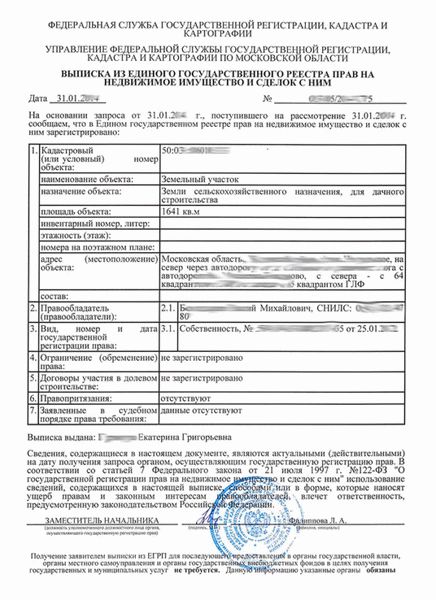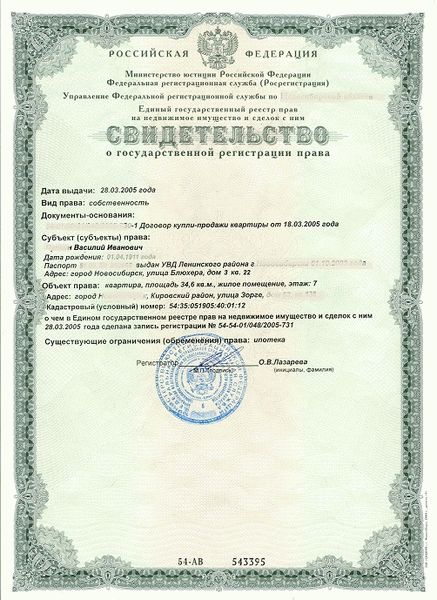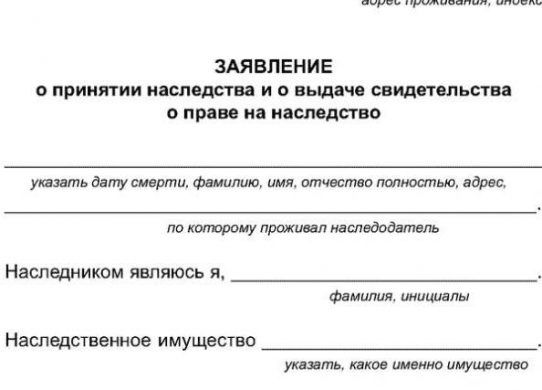Document confirming ownership
The name itself speaks for itself - confirmation. Without this paper, the right will not arise. Such a document is called differently :
- confirming the existence, termination, transfer or limitation of rights;
- a document base;
- title-determining
On their basis, one person’s right arises, another’s is terminated, and for others, the property is encumbered. What documents confirm ownership :
- Acts of state power and municipality:
- on the provision of land;
- on securing state property;
- Transactions aimed at the emergence and termination of rights :
- sale, donation, exchange, rent, will;
- Transactions aimed at encumbrance:
- rent, trust management, mortgage, easement;
- Documents confirming ownership, but not related to the transfer:
- land documents;
- permission to enter – for a newly constructed facility;
- building permit - for unfinished;
- declaration - for objects that do not require a construction permit;
- equity participation or replacement agreement;
- certificate from housing cooperative, GSK about payment of the share in full.
Document certifying ownership
State registration of real estate is an act of recognition by the state of your right. As such a certificate, the state, represented by Rosreestr, issues :
- state registration certificate;
- extract from the Unified State Register.
The certificate is issued with the rest of your papers after state registration. It is a form with watermarks, series and number . The certificate contains a summary of the Unified State Register records about the object, subject, rights, documents and restrictions existing at the time of issue.
Many copyright holders often consider the certificate to be a document of title. This is also due to the fact that various authorities and organizations require a certificate (for example, for registration, for collateral). This is a big misconception, since the certificate only certifies the registration of property and does not replace the basis documents . Failure to obtain a certificate does not invalidate your registered right. But in the absence of title papers, there will be neither registration nor certificate.
Extract from the Unified State Register . As a document certifying ownership, it contains the same information as a certificate. Issued by Rosreestr signed by the registrar within 5 days.
State registration is a very complex process. It is necessary to collect the necessary package of papers and certificates. It is sometimes difficult for copyright holders to distinguish a document certifying ownership from title papers. Rather than registering property at the expense of your time and nerves, it is better to trust the specialists .
Documents of ownership of real estate
Few people know that the certificates establishing ownership of the property were canceled in July 2021. More precisely, the documents have not lost their legal force, they are simply no longer issued by Rosreestr. You can simply get an extract.
For those who own real estate or who are planning to purchase it in the near future, it will be useful to familiarize themselves with changes in legislation in this area.
Certificate of ownership
From January 1, 2015, in accordance with paragraph 2 of the Requirements for filling out a certificate of state registration of rights to real estate, approved by Order of the Ministry of Economic Development of Russia dated December 23, 2013 No. 765 “On approval of the rules for maintaining the Unified State Register of rights to real estate and transactions with it, ..., forms of the certificate of state registration of rights and a special registration inscription on documents, requirements for filling out a certificate of state registration of rights and a special registration inscription, as well as requirements for the format of a special registration inscription in electronic form,” a new form of a certificate of ownership has been established.
We recommend reading: From what year did the insurance period begin to be counted?
The role of the certificate of ownership
The main piece of paper that can confirm that you are the owner of real estate is a certificate of registration of rights issued by Rosreestr.
From the latest version of the certificate form (since the type changed with changes in legislation), it was possible to find out which documents confirming the ownership of real estate were provided to the registering institution.
This is important to know: The procedure for deregistration from an apartment by the owner of registered
The title documents will be discussed further in the text, since the Certificate of Ownership of Real Estate has now been cancelled. This happened as a result of changes in Russian legislation in July 2021. However, it is necessary to know the role of this document (even if it is already in the past):
- confirmation that the owner is the person whose name appears on the certificate (or several people) and this is recorded in the unified register;
- It is impossible to carry out any actions with real estate without confirmation of rights to this. That is, previously, without having a certificate of ownership in hand, it was impossible to buy/sell, exchange, donate, or inherit an apartment and/or land plot;
- protection against various types of fraudulent actions aimed at depriving the owner of his property.
At the same time, it is necessary to understand the difference between the concepts of “owning real estate” and “owning real estate.” In the first case, you can only use the property (for example, live in an apartment). Registration of property rights also makes it possible to dispose of your real estate (for example, sell or donate).
How to check the authenticity of documents
The legal purity of real estate documents is a very important point when concluding a transaction. Most Russian citizens turn to legal or notary offices, as well as real estate agencies in order to check the purity of a future purchase, so that in the future there will be no problems with it or any pitfalls will surface.
This is important to know: Share in the common property of an apartment building
The property must not have any encumbrances or debts, and the documents must not be genuine or falsified.
A check for the authenticity of documents can also be ordered from the territorial registration authority, which will provide an extract from Rosreestr as of the current date, and you can also take an extract from the house register and from the BTI to check the presence of encumbrances.
A very important point when checking documents is the date of registration of documents and the presence of signatures and seals. The documents themselves should not contain corrections, errors or other adjustments.
Changes in legislation

On July 15, 2021, a new law came into force, according to which the issuance of certificates of ownership ceased.
This does not mean that this right does not need to be registered. No, the procedure for registering ownership of real estate has remained virtually unchanged. You simply need to confirm property registered after this date with an extract taken from Companies House. Positive sides
Of course, those who have previously received real estate papers in their hands will still have them. The document does not change its legal force. It’s just that the extract has a number of advantages that allow you to secure real estate transactions:
- this document reflects more information about the property of interest;
- the extracts reflect the most current information (the certificate is received once and the information specified in it is not updated during the entire time the property is in the ownership of citizens);
- there is no need to come to the office in person, you can order a document via computer and get acquainted with all the information by receiving it by email;
- short period of time to obtain information about the property;
- the possibility of falsifying documents is excluded, since they are stored only in electronic form (although skilled hackers cannot be ruled out) - an extract provided in paper form can be checked by the interested party even without the participation of the owner himself;
- an extract is the only document of title that can confirm the rights of the owner;
- an extract is received for the first time without paying a state fee;
- The “price” of the document for subsequent applications is slightly reduced (individuals will pay 200 rubles instead of 350, legal entities will pay 600 rubles instead of 1000).
It must be repeated that previously issued certificates are not cancelled, they simply can no longer be obtained or restored (if lost/damaged).
Negative points
But the innovation was not without its negative aspects. There are several main shortcomings in the adopted law:
- The system for obtaining an extract by citizens is not fully streamlined - in our capital, such a document can only be purchased in multifunctional centers, and in order to receive an extract with stamps and signatures from the authorized body, you will have to wait at least five days;
- for each real estate transaction (rent, donation, purchase and sale, etc.) you will need to take a new statement;
- the electronic registration system based on Rosreestr has not been installed or tested anywhere before, its reliability has not been checked, so the final result is not known;
- Not everyone can master using a computer, especially people of retirement age. For them, understanding electronic document management is quite difficult, so the innovation may not take root in a certain social environment.
Let's give an example of a positive property. Let's say a certain Kungurtsev V.A. sells a one-room apartment and provides the potential buyer only with a certificate of title to it. Buyer Zdvintseva K.V. I decided to play it safe and read the extract (since the certificate was received more than four years ago).
It turned out that this apartment was under arrest (pledged, etc.). That is, she is burdened with debt obligations, including the division of property during a divorce and/or alimony debts. So, for buyers, the benefits of receiving an extract in this case are obvious.
Legal basis

But before applying for an extract from the unified register, ownership must be registered. What title and other documents must be submitted to Rosreestr:
- agreements confirming the fact of donation, purchase and sale, exchange, rent, etc.;
- duly registered certificate of registration;
- a certificate from a notary confirming the right to receive an inheritance;
- documents from the State Insurance Company or Housing Insurance Company confirming that the established amount of the share has been paid in full;
- a will on the basis of which real estate is inherited (also from a notary);
- documents for equity participation, etc.
Don't forget about your identification documents. In each case, employees will tell you what papers they need to bring to register ownership and in what order they should be completed and/or certified.
Types of documents that confirm ownership of an apartment
As confirmation of a person’s right to own an apartment, there can be papers that were issued both under the USSR and in the Russian Federation. Among them there are differences in the method of obtaining property ownership.
This is important to know: Allocation of a share in a mortgaged apartment to a minor child
They can be classified by:
The time period or, more simply put, the period when it was issued:
Vidu:
- Establishing title (purchase and sale agreements, exchanges, mortgage agreements, donations, certificate of registration of rights, privatization agreement, will).
- Certificate of title (certificate of payment of a share in a housing construction cooperative, extract from the Unified State Register).
What document confirms ownership of the apartment?
Have questions? Consult a lawyer (free of charge, 24 hours a day, seven days a week):
Each owner of real estate more than once has to provide various authorities with a document proving his right of ownership of a specific object. This is not difficult to do, but you need to know exactly what kind of paper should be prepared.
Acquisition of living space is carried out only if certain criteria are met. The buyer must make sure that he is purchasing the property from the real owner and not from a scammer. The following describes in detail which document confirms ownership of the apartment.
Do I need a cadastral passport to obtain a certificate of ownership of an apartment?
It is the cadastral passport (CP) that describes the property from the technical side. To obtain a certificate of ownership of an apartment, it is necessary to provide a cadastral passport. If you need to urgently obtain a certificate for an apartment, it is possible to expedite the receipt of a CP.
At the moment, the Unified State Register is being actively reformed, into which technical data on real estate objects and transactions with them is entered. If you previously had experience communicating with the registrar, you provided a cadastral passport for your property, and no changes occurred, there is no need to provide a cadastral passport again.
How to prove ownership
Since 2021, the form of title documentation has undergone significant changes. The main changed factor for apartment sellers is that the certificate with a continuous validity period has been cancelled.

Important: Today this paper has been replaced by an extract from the unified state real estate register. It is also provided instead of a cadastral passport, the issuance of which has already been discontinued. But, nevertheless, this document can also be attached to the general kit.
If a citizen does not know what the document on ownership of an apartment looks like, he can resolve the issue in one of the following ways:
- Using the Internet. You must go to the official website of Rosreestr and fill out a request to receive the required documents. But first you need to register and go through authorization.
- Contact the nearest MFC. You can contact this institution in person or sign up for a queue online. In the second case, all necessary papers will be prepared in the shortest possible time. In this way, the applicant will save time.
- Contact the Rosreestr office and fill out an application to provide the necessary documents.
This is important to know: How to divide bills in a non-privatized apartment
Each of these methods has its pros and cons. Therefore, the interested person should choose the most convenient one for himself.

Help: Ordering and receiving documents through online resources is much faster and allows you to obtain the necessary information without leaving your home.
In this case, you need to keep in mind a few nuances:
- Only the owner of the property has the right to receive an extract in a detailed form, but anyone can order a standard certificate.
- It is advisable to order the document immediately before the purchase and sale transaction - its validity period is limited.
Grounds for the right to own housing
No one has the right to claim ownership of real estate without the necessary grounds for this. It is required to have certain papers proving that a specific person can manage and own property. The supporting documents are discussed below.
Contract of sale
This agreement is a confirmation of ownership of the apartment - an extract from the Unified State Register of Real Estate, and also guarantees that the owner owns the property legally. Typically this document must be notarized. In this regard, its authenticity is undeniable.
Will
The paper proves that the citizen received the right to own the property by inheritance. In this situation, the rules for registering housing ownership are somewhat different. The person receiving the property is subject to two criteria. The first of these is the will of the deceased, who left a legal will indicating the inheritor. Moreover, this may not only be a close relative. The will of the deceased is carried out according to the law. But this decision can be challenged through the courts. If a will is not drawn up, then the ownership of the property passes to the next-closest heir.

Donation agreement
The paper differs from the purchase and sale agreement by the value of the object being accepted as a gift. The presence of a deed of gift means that the property is transferred into the possession of another person free of charge. Whereas in a sale and purchase, the buyer is required to pay a certain amount to the seller. But in both cases, the agreement is drawn up in writing. It comes into force from the moment of signing. The gift agreement is considered a document of title, on the basis of which any transaction with real estate can be made.
Rent agreement
This is a transaction with characteristic features when the owner transfers his apartment for use for monthly payments. Such an agreement must be notarized. State registration is also required. Rent is considered one of the types of encumbrances, information about which must be entered into the state register. That is, the right to own and perform actions with the object passes to the payer, but only for the period fixed in the contract.
Barter agreement
In other words, it is an exchange transaction. For example, when a one-room apartment is changed to a two-room apartment. This implies an additional payment.
Equity contract
It is drawn up between the investor and the developer. If a participant in shared construction no longer needs unfinished real estate, he has the right to transfer it to another person.
How to register ownership of a garden house?

Lawyer Antonov A.P.
A garden house is a building for seasonal use, designed to satisfy citizens' household and other needs related to their temporary stay in such a building (clause 2 of article 3 of Law dated July 29, 2017 N 217-FZ). Obtaining permits for construction and commissioning of a garden house is not required. Currently, there is an obligation to send to the body authorized to issue construction permits (hereinafter referred to as the authorized body) a notification of the start and completion of construction of a garden house. At the same time, until 03/01/2026, registration of rights to a garden house that meets the established parameters of an individual housing construction project is allowed, without the specified notification. The right to choose the procedure for registering such a property belongs to its copyright holder. In addition, there is no requirement to send notices of the start and completion of construction in relation to a garden house created on a garden plot of land, the cadastral registration of which was carried out before 08/04/2018. Failure to register ownership of a built garden house may lead to its recognition as unauthorized construction and subsequent demolition (clause 39 of article 1, clause 1 of part 17 of article 51, part 1 of article 51.1, part 15, 16 of article 55 Civil Code of the Russian Federation; Article 222 of the Civil Code of the Russian Federation; Parts 12, 22, Article 70 of the Law of July 13, 2015 N 218-FZ; Part 6.1 of Article 16, Article 17 of the Law of August 3, 2018 N 340-FZ; Letters of Rosreestr dated 01/19/2021 N 13-00021/21, dated 02/08/2021 N 13-0775-AB/21). To register ownership of a garden house, we recommend following the following algorithm.
Step 1. Contact a cadastral engineer to prepare a technical plan for a garden house. The technical plan is prepared by a cadastral engineer and contains information about the garden house, including those included in the Unified State Register of Real Estate (Article 37 of the Law of July 24, 2007 N 221-FZ; Part. 1, Article 24 of Law No. 218-FZ). You can get a list of cadastral engineers on the Rosreestr website. You can also contact the BTI at the location of the garden house, but check whether they have a cadastral engineer on their staff. Provide the cadastral engineer with the following documents (Part 11, 11.1 Article 24, Part 12 Article 70 of Law No. 218-FZ; clause 1 of the Requirements for preparing a declaration, approved by Order of the Ministry of Economic Development of Russia dated December 18, 2015 No. 953): notification of the developer about the planned construction of a garden house (if any); notification about the compliance of the garden house with the maximum parameters of permitted construction and the admissibility of placing a garden house on the land plot (if any); a declaration drawn up and certified by the owner of the land plot on which the completed property is located. You can draw up a declaration yourself or seek help from a cadastral engineer. The cadastral engineer may request additional documents from you, so it is recommended to check the list of documents with the cadastral engineer in advance. The technical plan is prepared, among other things, in the form of an electronic document and certified by an enhanced qualified electronic signature of the cadastral engineer who prepared such a plan (Part 12 of Article 24 of Law No. 218-FZ). The technical plan may be placed for temporary storage in an electronic storage facility maintained by the rights registration authority. The contract for the performance of cadastral work may provide for the obligation of the cadastral engineer to place the technical plan prepared by him in the electronic storage (Parts 3, 5, Article 20 of Law No. 218-FZ; Part 8, Article 36 of Law No. 221-FZ). A contract for carrying out cadastral work may grant a cadastral engineer the right to submit a technical plan to the rights registration authority without a power of attorney (Clause 4, Part 2.1, Article 36 of Law No. 221-FZ).
Step 2. Prepare the necessary documents For cadastral registration and registration of ownership of a garden house, the start of construction of which was notified to the authorized body, the following documents are required (part 1, 2 of article 14, part 1.2 of article 19, part 10, Article 40 of Law No. 218-FZ; Part 16, Article 55 of the Civil Code of the Russian Federation): notification of the completion of construction of a garden house; technical plan; title document for the land plot (not required if the right to the land plot was previously registered in the Unified State Register of Real Estate); a document confirming the authority of the representative (if the notification is sent by the representative); an agreement concluded by the owners of a land plot to determine their shares in the right of common shared ownership of a built garden house (if the land plot on which it is built belongs to two or more citizens). To register ownership of a garden house, you must pay a state fee. Information about the payment of the state duty must be indicated in the notice of completion of construction (Article 17, Part 7, Article 18 of Law No. 218-FZ; Part 16, Article 55 of the Civil Code of the Russian Federation).
Until 03/01/2026, for cadastral registration and registration of ownership of a garden house, a notice of the start of construction of which was not sent to the authorized body, will be required (Part 12, Article 70 of Law N 218-FZ; Letter of the Ministry of Economic Development of Russia dated 08/13/2019 N 26559- VA/D23i): technical plan; title document for the land plot (not submitted if the applicant’s right to this land plot is registered in the Unified State Register of Real Estate). In this case, the garden house must comply with the established limit parameters, the type of permitted use of the land plot on which it is created, urban planning regulations, etc. (Parts 12, 13, Article 70 of Law N 218-FZ; clauses 3, 3.1 of the Rosreestr Letter dated 03/05/2021 N 14-1578-GE/21; Letter of the Ministry of Construction of Russia dated 03/05/2021 N 5336-OG/08). Registration of ownership of a garden house created on a garden plot of land, cadastral registration of which was carried out before 08/04/2018, is carried out on the basis of a title document for the corresponding land plot. If the right to a land plot is registered in the Unified State Register of Real Estate, this document is not required to be submitted (Part 22, Article 70 of Law No. 218-FZ; Part 6.1, Article 16, Article 17 of Law No. 340-FZ). You will also need to pay a state fee for registering property rights in the amount indicated above. In the latter case, proceed to step 4.
Step 3. Submit documents to the authorized body Cadastral registration and registration of ownership of a built garden house, subject to the notification procedure for construction, are carried out upon the application of the authorized body. To do this, no later than a month from the date of completion of the construction of the garden house, you must send to the specified authority a notice of completion of construction and other necessary documents (Part 1.2 of Article 19 of Law No. 218-FZ; Part 16 of Article 55 of the Civil Code of the Russian Federation). This can be done in one of the following ways (Part 16, Article 55 of the Civil Code of the Russian Federation): through a personal appeal to the authorized body, including through the MFC; by post with acknowledgment of receipt; through the Unified Government Services Portal. Within seven working days from the date of receipt of your notification and the necessary documents, the authorized body will inspect the garden house for compliance with the requirements of the law and send an application for state cadastral registration and state registration of rights to the rights registration authority, about which you will be sent relevant notifications (Part. 1.2, Article 19 of Law No. 218-FZ; Part 19, Article 55 of the Civil Code of the Russian Federation). If the authorized body fails to send the application and documents to the rights registration authority within the prescribed period, you can send the said application yourself. In this case, the necessary documents will be requested by the rights registration authority from the authorized body within three days from the date of receipt of your application (Part 1.2 of Article 19, Part 2 of Article 33 of Law No. 218-FZ). If the necessary documents have not been sent by the authorized body to the rights registration authority, proceed to step 4.
Step 4. Apply for registration of property rights You can submit the application for registration and the necessary documents in one of the following ways (Part 1, Article 3.1, Part 1, 2, Article 18 of Law N 218-FZ; Clause 1 of the Regulations, approved. Decree of the Government of the Russian Federation dated 01.06.2009 N 457; clauses 1, 2 of Appendix No. 1 to the Order of Rosreestr dated 30.12.2020 N P/0509; clause 1.2 of the Order of Rosreestr dated 18.10.2016 N P/0515): directly (in person or through a representative by proxy) in the Federal State Budgetary Institution "FKP Rosreestr" or the MFC, including regardless of the location of the property according to the list of divisions posted on the Rosreestr website. In Moscow, documents for state registration are accepted only through the MFC, except for extraterritorial reception; during an on-site reception according to the list of departments posted on the Rosreestr website; by mail with a declared value when sent, a list of the contents and a notification of delivery according to the list of departments posted on the Rosreestr website; in electronic form, including via the Internet through the Unified Portal of State Services and the Rosreestr website. If the application for state cadastral registration and (or) state registration of rights is submitted in the form of a paper document, the technical plan is attached to it on an electronic storage medium (for example, an optical CD or USB drive), which is returned to the applicant if there is an appropriate instruction in the statement. If the technical plan is placed in temporary storage in an electronic storage facility, then when submitting the application and the documents attached to it, you have the right to indicate in the application the identifying number of the technical plan. In this case, its presentation will not be required (Part 4, Article 20 of Law No. 218-FZ; Clause 5 of Appendix No. 1 to Order of Rosreestr No. P/0509). It is not required to submit a technical plan if, in cases established by the contract, the right to submit a technical plan to Rosreestr is granted to the cadastral engineer (clause 4, part 2.1, article 36 of Law No. 221-FZ). When sending documents by mail, the authenticity of the signature on the application must be notarized; a copy of an identification document (passport) is attached to the application, as well as a notarized power of attorney if the documents are submitted by a representative (Part 12 of Article 18 of Law No. 218-FZ ). When submitting documents in person, you must present an identification document of the applicant (passport) (Part 8, 15, Article 18 of Law No. 218-FZ). Documents submitted in electronic form must be certified by an enhanced qualified electronic signature of the applicant, unless otherwise provided by law (clause 2, part 1, article 18 of Law N 218-FZ; clause 3 of Appendix No. 1 to Order of Rosreestr N P/0509 ). The period for state cadastral registration and state registration of rights should not exceed 10 working days from the date of receipt of the application and necessary documents by the rights registration authority (12 working days - if documents are submitted through the MFC) (clauses 5, 6, part 1, article 16 of the Law N 218-FZ). This period begins on the next working day after the date of receipt of documents. However, if at the time of submission of the application and the necessary documents in the State Information System on state and municipal payments there is no information on the payment of the state duty for state registration and the document on its payment is not submitted along with the specified application, the period of state registration begins from the date Rosreestr receives information about payment of the state duty (Part 7, Article 18 of Law No. 218-FZ; Letter of Rosreestr dated August 22, 2017 No. 14-10188-GE/17). State cadastral registration and state registration of rights to real estate are certified by an extract from the Unified State Register of Real Estate (Part 1 of Article 28 of Law No. 218-FZ).
Note! From the moment of registration of ownership of a garden house in relation to this house, you have an obligation to pay property tax for individuals (Articles 400, 401 of the Tax Code of the Russian Federation).
Sincerely, lawyer Anatoly Antonov, managing partner of the law firm Antonov and Partners.
Still have questions for your lawyer?
Ask them right now here, or call us by phone in Moscow +7 (499) 288-34-32 or in Samara +7 (846) 212-99-71 (24 hours a day), or come to our office for a consultation (by pre-registration)!
What to do if lost
Infrequently, but situations do occur when the owner loses title documentation. In this case, you must proceed as follows:
- To reinstate certificates that were issued before 1998, the property owner should contact their local Housing and Housing Authority. You must have your passport with you. The applicant must fill out an application for a duplicate certificate. In this case, you need to take into account that you will need to pay a state fee.
- Within 15 working days, government agency employees prepare a certificate similar to the original.
- When privatizing housing after 1998, it is not necessary to restore a copy of the agreement. It is enough to keep a certificate stating that Rosreestr has title certificates. You can also write an application to re-receive confirmation of state registration.
Thus, the documents confirming the ownership of the apartment, as well as the procedure for obtaining and restoring them, are examined in detail. This documentation is necessary to carry out any transactions with real estate.
Official website of the Supreme Court of the Russian Federation
The highest authority examined the case of a resident of Novorossiysk, who unsuccessfully tried to receive a residential house and land plot under his will. The stumbling block was that the testator did not properly register this property during her lifetime.
The crux of the matter
Despite the fact that the ownership of the property by the testator was confirmed by an extract from the household register of the local administration, the court refused to include the residential building and land in the inheritance, since the notary did not issue a certificate of title to this property, limiting itself to only a certificate of title to the funds in a bank account.
At the same time, the court indicated that the presented extract from the household register is not a title document confirming ownership.
The appellate and cassation courts supported these conclusions. However, the Supreme Court found that the decisions were made with a significant violation of the norms of substantive and procedural law and it was impossible to agree with them.
Position of the Armed Forces
“If the right to an object of real estate arose before January 31, 1998 - the date of entry into force of the law of July 21, 1997 No. 122-FZ “On state registration of rights to real estate and transactions with it”, then the moment of emergence of such a right is not related to its state registration, such a right is recognized as legally valid even in the absence of its state registration,” explains the Supreme Court.
Thus, in order to properly resolve the dispute, it was necessary to establish the moment when ownership of the disputed residential building arose, explains the highest authority. However, the courts did not do this.
The courts also ignored the corresponding legal assessment of the fact that the extract from the household register issued by the local government body - the administration of the rural district - indicated that the testator owned the disputed residential building as personal property.
At the same time, the legislation of the RSFSR provided for the maintenance of non-economic books by village councils and registration of the population and the transfer of reports to higher state bodies, these “files” also reflected data on the owners of households and buildings (clause 7 of Article 11 of the RSFSR Law of July 19, 1968) , reminds the sun.
Non-economic books as an accounting document for personal subsidiary plots continue to exist in rural areas to this day, as provided for in Article 8 of the Federal Law of July 7, 2003 No. 112-FZ “On personal subsidiary plots,” the highest authority indicates.
“Based on the above regulatory provisions, an extract from the household register is one of those documents on the basis of which the ownership of a residential building, which is the personal property of the household, could be registered in the Unified State Register of Real Estate, which was not taken into account by the courts,” notes Sun.
In connection with this, the Supreme Court decided to cancel the judicial acts taken in the case regarding the refusal to include a residential building in the inheritance estate and send the case for a new trial to the court of first instance.
Alice Fox






